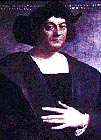|
More People |
|||||||||||||||||||
|
|
|||||||||||||||||||
|
|||||||||||||||||||
|
|
|||||||||||||||||||
|
Biography | Photos |
|||||
|
Columbus believed that the world was smaller than commonly thought, and that by sailing west he could reach Asia. He asked for financial support from the Portuguese royalty, but was not given it. He did receive funds in Spain in April of 1492, when King Ferdinand V and Queen Isabella I agreed to support his voyage. Columbus soon sailed westward. Sailing on three ships, the Nina, Pinta, and Santa Maria, Columbus took about 90 men with him on this important trip. Columbus' first journey of ended in the Bahamas. From there, he sailed on to Cuba, arriving on October 28, 1492. He believed he had reached Japan, and returned to Europe to tell everyone. Columbus returned to the Caribbean on his second voyage. In 1494, he visited Cuba's coast. By 1896, the Spanish had established a colony on the nearby island of Hispaniola (now containing Haiti and the Dominican Republic). The settlement there conquered Cuba in 1511. Columbus returned to Spain and made other voyages to the new world. He died in 1506. |
|||||
 Christopher Columbus was born in Genoa, Italy in 1451. He would become the first European to visit Cuba and would cause many more to follow.
Christopher Columbus was born in Genoa, Italy in 1451. He would become the first European to visit Cuba and would cause many more to follow.